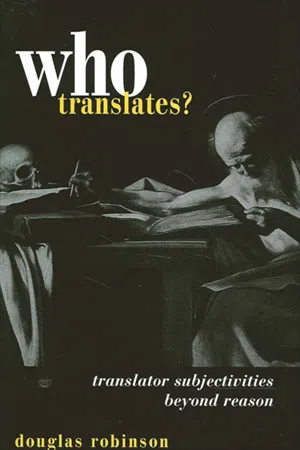
- 208 pages
- English
- PDF
- Available on iOS & Android
About this book
2001 CHOICE Outstanding Academic Title Translators have long claimed that their job is to "step aside and let the source author speak through them." In Who Translates? Douglas Robinson uses this adage to set up a series of "postrationalist" perspectives on translation, all based on the recognition that translation has always been thought of in terms of the translator's surrender to forces beyond his or her rational control. Exploring this theme, Robinson examines Plato's Ion, Philo Judaeus and Augustine on the Septuagint, Paul on inspired interpreters, Joseph Smith on the Book of Mormon, and Schleiermacher, Marx, and Heidegger on translation. He traces the imaginative and historical linkages between twentieth-century conceptions of ideology and ancient conceptions of spirit-channeling, and the performative inversion of power relations by which the "channel" (or translator) comes to wield the source author as his or her tool. And he argues throughout for a postrationalist conception of translation based not on the translator's rational control of words and meanings but rather on a flowing through the translator of voices and textualities.
Frequently asked questions
- Essential is ideal for learners and professionals who enjoy exploring a wide range of subjects. Access the Essential Library with 800,000+ trusted titles and best-sellers across business, personal growth, and the humanities. Includes unlimited reading time and Standard Read Aloud voice.
- Complete: Perfect for advanced learners and researchers needing full, unrestricted access. Unlock 1.4M+ books across hundreds of subjects, including academic and specialized titles. The Complete Plan also includes advanced features like Premium Read Aloud and Research Assistant.
Please note we cannot support devices running on iOS 13 and Android 7 or earlier. Learn more about using the app.
Information
Table of contents
- Who Translates?
- Contents
- Acknowledgments
- Introduction: Who Translates?
- PART ONE: The Spirit-channeling Model
- PART TWO: Ideology
- PART THREE: Transient Assemblies
- Conclusion: Beyond Reason
- Works Cited
- Index